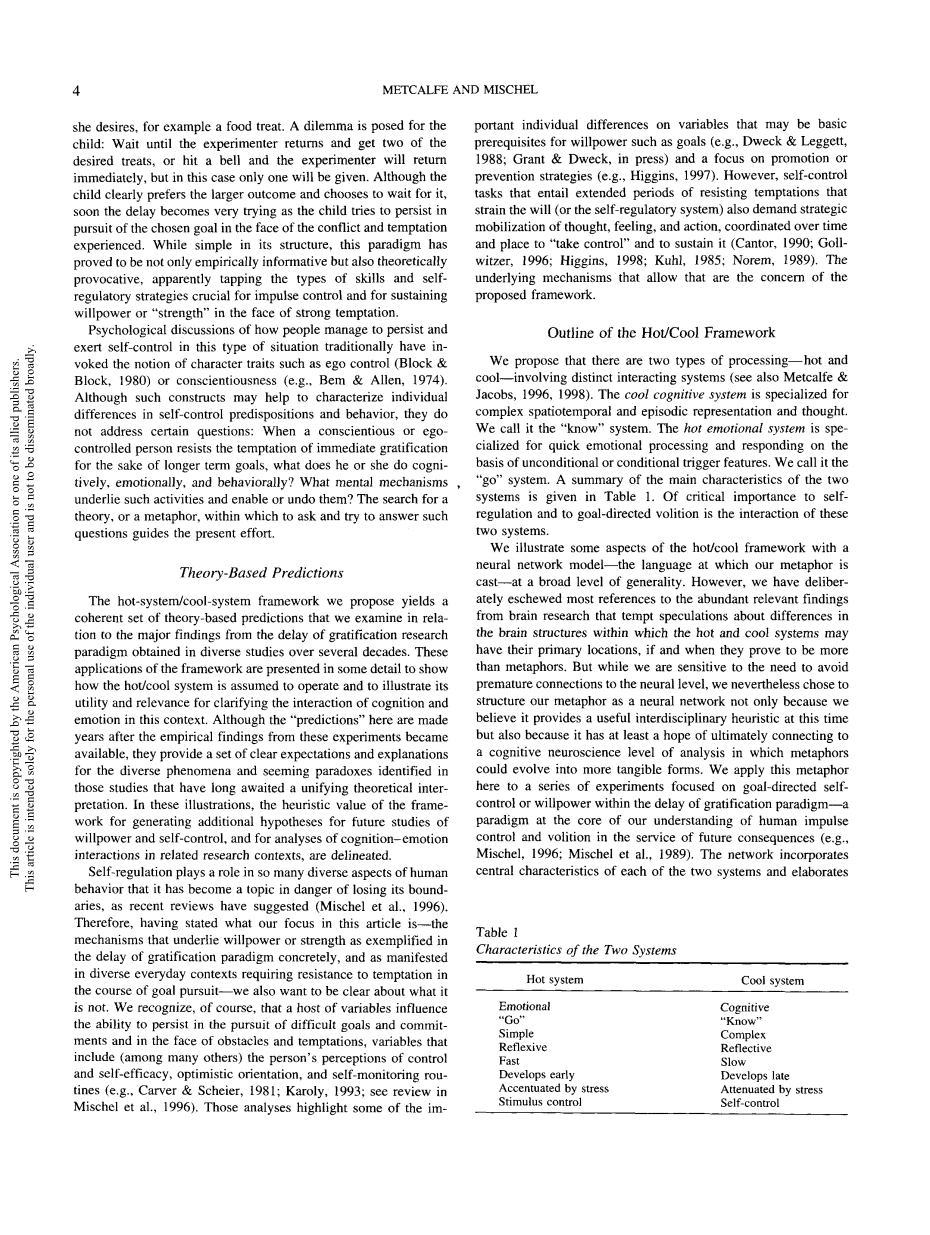

英语原文共 17 页,剩余内容已隐藏,支付完成后下载完整资料
A Hot/Cool-System Analysis of Delay of Gratification: Dynamics of Willpower延迟满足的热/冷系统分析:意志力的动力学
A 2-system framework is proposed for understanding the processes that enable—and undermine—selfcontrol or 'willpower' as exemplified in the delay of gratification paradigm. A cool, cognitive 'know' system and a hot, emotional 'go' system are postulated. The cool system is cognitive, emotionally neutral, contemplative, flexible, integrated, coherent, spatiotemporal, slow, episodic, and strategic. It is the seat of self-regulation and self-control. The hot system is the basis of emotionality, fears as well as passions—impulsive and reflexive—initially controlled by innate releasing stimuli (and, thus, literally under 'stimulus control'); it is fundamental for emotional (classical) conditioning and undermines efforts at self-control. The balance between the hot and cool systems is determined by stress, developmental level, and the individuals self-regulatory dynamics. The interactions between these systems allow explanation of findings on willpower from 3 decades of research.
本文提出了一个双系统框架来理解延迟满足范式中的自我控制或“意志力”的形成和破坏过程。这里假设了一个冷静的、认知的“know”系统和一个热情的、冲动的“go”系统。“know”系统是认知的、情感中立的、沉思的、灵活的、综合的、连贯的、时空的、缓慢的、幕式的和战略性的。它是自我调节和自我控制的场所。“go”系统是情绪的、恐惧和激情的基础,由先天释放刺激控制冲动和反射(因此,字面上是在“刺激控制”下);它作用于情绪(经典)调节,并且会抑制自我控制。热系统和冷系统之间的平衡取决于压力、发育水平和个体的自我调节动态。这些系统之间的相互作用可以解释30年来关于意志力的研究结果。
The question that we address here is, if humans initially are driven by impulses pressing for immediate release, ruled by a pleasure principle, and largely indifferent to reason—as has long been assumed—we need to understand how they become able to control their actions and feelings, overcoming the power of stimuli to elicit automatic reactions, and exerting the self-control strategies or 'willpower' essential for the execution of their difficult-toachieve intentions. In recent years, there has been a virtual explosion of research and theorizing about self-regulatory processes that have illuminated many aspects of self-regulation relevant to willpower (Baumeister amp; Heatherton, 1996; Cervone, 1996; Cervone, Jiwani, amp; Wood, 1991; Cervone amp; Wood, 1995; Dodge, 1986, 1993; Loewenstein amp; Prelec, 1993; Marlatt, 1996a, 1996b, Marlatt, Baer, Donovan, amp; Kivlahan, 1988; Mischel, Cantor, amp; Feldman, 1996; Mischel amp; Patterson, 1976, 1978; Mischel, Shoda, amp; Rodriguez, 1989; Rodriguez, Mischel, amp; Shoda, 1989).
我们在这里希望解决的问题是,如果像长期以来一直认为的那样,人类最初是由即时性的冲动驱动的,受快乐原则的支配,并且基本上对理性漠不关心,我们需要理解人类后来是如何能够控制自己的行为和感受的,克服刺激的力量以引发自动反应,并运用自我控制策略或“意志力”来实现他们难以实现的意图。近年来,关于自我调节过程的研究和理论几乎呈爆炸式增长,这些研究和理论阐明了与意志力相关的自我调节的许多方面(见上面括号内容)。
Nevertheless, the nature of willpower, as assessed in situations like the delay of gratification paradigm (Mischel amp; Ebbesen, 1970), remains debatable. For example, Baumeister and Heatherton (1996) discussed the underregulation that occurs when willpower fails as 'a matter of inadequacy in ones strength to override the unwanted thought, feeling or impulse' (p. 3) and described many of the conditions that may enhance or undermine such strength. They also made clear the costs of failures of self- regulatory strength evident from crime and teen pregnancy to alcoholism and drug addiction, to domestic violence and educational underachievement. Yet, the nature of that strength, and the processes that underlie it, still await a unifying theoretical account. The hot-system/cool-system framework we propose here yields specific theory-based predictions that address this theoretical challenge.
然而,在延迟满足范式(Mischelamp;Ebbesen,1970)情况下评估的意志力的性质仍有争议。例如,Baumeister和Heatherton(1996年)讨论了监管不足所导致的意志能力失败,认为这是“一个人在克服不必要的想法、感觉或冲动方面的力量不足”(第3页),并描述了许多可能增强或削弱这种力量的条件。他们还明确指出了自我调节能力失败的代价,从犯罪和青少年怀孕到酗酒和吸毒,再到家庭暴力和教育成绩不佳。然而,这种力量的性质,以及其背后的过程,仍有待于一个统一的理论解释。我们在这里提出的热系统/冷系统框架做出了具体的理论分析预测以对这一领域发起挑战。
Willpower: Overcoming Stimulus Control意志力:克服刺激控制
In this article, the aspect of willpower that is our concern is the ability to inhibit an impulsive response that undoes ones commitment (e.g., to bypass dessert, to forgo tobacco or alcohol or cocaine, etc.). We illustrate how the interaction of the hypothesized two systems—one 'hot' and the other 'cool'—can enable individuals to overcome the power of stimulus control (documented and extolled in 5 decades of behaviorism) and, thus, purposefully prevent powerful stimuli from eliciting their impulsive immediate responses that quickly undo their best intentions.
在本文中,我们关注的意志力方面是抑制冲动反应的能力,这种冲动反应会破坏一个人的承诺(例如,绕过甜点,放弃烟草、酒精或可卡因等)。我们说明了假设的两个系统——一个是“热”系统,另一个是“冷”系统——的相互作用如何使个体克服刺激控制的力量(最近50年里被行为主义所记录和提倡的),从而,有意识地防止强大刺激引发即时性冲动从而迅速打破他们规划和想法的情况发生。
We focus our analysis and predictions on the delay of gratification paradigm because it is a prototype for the study of willpower in the pursuit of difficult goals that has been researched extensively empirically, both experimentally and longitudinally (reviewed in Mischel, Ebbesen, amp; Zeiss, 1972; Mischel et al., 1989). In addition, it is proving to be remarkably diagnostic of individual differences in self-regulatory competencies that appear to have important long-term implications for social and cognitive adaptation. For example, in certain conditions of this paradigm, the number of seconds a preschooler is willing to wait for two marshmallows, rather than settling for one available immediately, is predictive of cognitive and social outcomes decades later, including Scholastic Aptitude Test (SAT) scores (Mischel, 1996; Mischel et al., 1989; Shoda, Mischel, amp; Peake, 1990).
我们将分析和预测的重点放在延迟满足范式上,因为它是一个在追求困难目标的过程中研究意志力的原型,并且已经在实验和纵向上进行了广泛的实证研究(在Mischel、Ebbesen和蔡司,1972年;Mischel等人,1989年进行了综述)。此外,它被证明对自我调节能力的个体差异具有显著的诊断作用,而自我调节能力似乎对社会和认知适应具有重要的长期影响。例如,在这种范式的某些条件下,学龄前儿童愿意等待两个棉花糖的秒数时间,而不是满足于立即得到一个棉花糖的秒数时间,或者可以预测几十年后的认知和社会结果,包括学业能力倾向测试(SAT)分数(米谢尔,1996年;米谢尔等人,1989年;肖达、米谢尔和皮克,1990年)。
The Delay of Gratification Paradigm延迟满足范式
In the delay of gratification paradi
剩余内容已隐藏,支付完成后下载完整资料
资料编号:[587917],资料为PDF文档或Word文档,PDF文档可免费转换为Word


